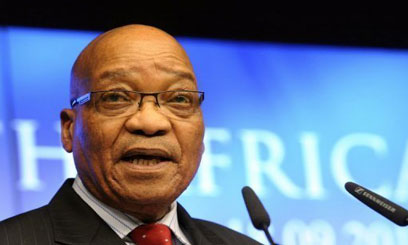
Zuma also called on senior officers in business and government to freeze salary increases and bonuses for one year/AFP-File
After nearly five hours spent behind closed doors corralling business and labour leaders, Zuma emerged with a collective demand for the tens of thousands who have downed tools illegally to go back to work “as soon as possible and for production in the mining industry to be normalised.”
Zuma also called on senior officers in business and government to freeze salary increases and bonuses for the next year as a “strong commitment to build an equitable economy.”
Eviscerated by critics for failing to stop months of roiling strikes that have often spilled over into deadly violence, Zuma’s comments mark the government’s first decisive step to halt the widespread unrest.
But it is unclear if the meeting will move the ball forward, let alone end a crisis that has spread like wildfire across the country’s industrial heartland and threatened to cripple already meagre growth.
While Zuma and leaders representing major business associations and organised labour signed onto the statements, ultimately ending the crisis will come down to individual mine owners and miners who increasingly question the legitimacy of established trade unions.
According to political commentator Moeletsi Mbeki, the police’s killing of 34 platinum miners at Marikana on August 16 has destroyed the government’s credibility as an honest broker and miners are unlikely to heed Zuma’s entreaties.
“They are in no position to mediate,” said Mbeki, who is also the younger brother of former South African president Thabo Mbeki. “They should never have used force against the miners… that hardened the position of the workers.”
“The government has been incredibly casual and callous about an industry that is important to millions of South Africans.”
Industrial relations are a subject fraught with political and economic dangers for Zuma, whose fate hangs on balancing policies that appeal to investors as well as leftists, communists and trade unionists within his ruling coalition.
“The government is a huge beneficiary of the mining industry in South Africa in terms of the taxes that it gets from the mining industry,” said Mbeki. “It sees itself losing taxes and losing hard currency earnings.”
But with two months until a party conference that could see him face a leadership challenge that would oust him from office, the political stakes could not be higher.
“It now challenges him personally because he wants to go to the African National Congress conference in Mangaung in December with a clean report,” said Joe Mavuso, an independent analyst
“No president wants to lead a country that is bleeding economically otherwise it speaks ill of him.”
In an effort to halt that slide Zuma on Wednesday also announced measures to develop down-at-heel mining towns, where people live in slums around mines with no electricity, running water or sanitation.
The plan includes ramping up projects to build public roads and put more people on the electricity grid.









































